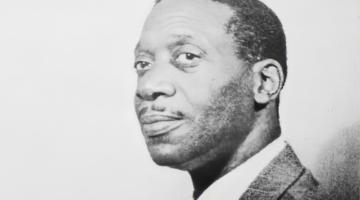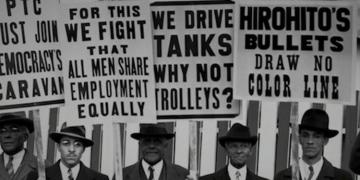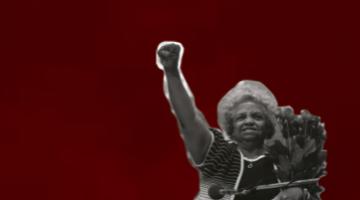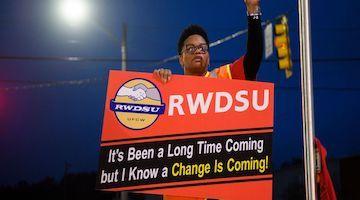Saladin Muhammad was the founder of Black Workers for Justice. He played a key role in developing Black revolutionary labor organizing.
“African Americans need a national political framework with an anti-capitalist, anti-imperialist and internationalist program – a national liberation front…” (Saladin Muhammad, Marxism, Reparations and the Black Freedom Struggle)
Our dear brother, leader, confidant, mentor and model servant of our people, Saladin Muhammad, joined our revolutionary ancestors on September 19, 2022 in Rocky Mount, North Carolina. Saladin was 76 and had been battling illness for a while.
When our revolutionary elders leave this material world, we often say another giant has fallen as a testament to their contribution and the love that we have for them. But sometimes, that characterization is just not enough. This is one of those times. Brother Saladin occupied a category that only a few have occupied. As one of only a handful of strategic thinkers and organizers of our movement that had not retired (how does a member of an oppressed nation and class retire from revolution?) Saladin continued to provide the leadership that he had given for well over five decades.
Sister Ashaki Binta, who worked with Saladin captures what he meant to all of us:
“Brother Saladin leaves an outstanding legacy of revolutionary commitment, leadership, consciousness, and direct organizing of our people’s struggle for liberation. He was a commander-in-chief of revolutionary forces throughout the Black Liberation Movement and a staunch fighter for the Black Working Class. He worked tirelessly and with phenomenal energy to organize, guide, and lead our people’s fights and battles against oppression. He was an internationalist, upholding the world-wide struggle against capitalism and imperialism. His intellect, insight and analysis was outstanding in the theory and practice of organizing class and revolutionary struggle and the tactics and strategy of social transformation, national liberation, and socialism for the African American people.”
Asé!
I met Saladin around 1987, just a few years after I “went South” to organize. I was working for the last of the 1964 Mississippi Summer organizations, the Voter Education Project, at that time being run by another one of my mentors Ed Brown, the older brother of Jamil al-Amin (H. Rap brown). I was helping to organize a fightback in a Black community that was attempting to reconstitute itself as the municipality of Keysville in southern Georgia. Saladin was there representing the Black Workers for Justice that had been organized a few years earlier. I was immediately struck by his strategic vision, organizational skills and steady, humble revolutionary leadership. A few years later I was a proud member of BWFJ and even though we parted ways, I maintained a relationship with the comrades and with Saladin over the years. He was always there for me with strategic advice and never hesitated to support me no matter if he agreed with every aspect of what I was attempting or not. That I will never forget.
Brother Abdul Akalimat, another of our revolutionary elders who worked with Saladin for many years, especially the last few years in the various efforts to build a national framework for Black left unity, shared some of the remaining strategic questions Saladin was still grappling with until the very end:
- What are the paths out of the working class into revolutionary movements for social transformation? What is the role of family, childhood friends, cultural practices, and neighborhood political culture?
- How does Black resistance become a conscious part of the Black liberation movement? What is the role of a progressive Black nationalism, and how can it link to working class issues?
- How has the struggle in the African Diaspora for national liberation from colonialism and imperialism impacted the Black liberation movement in the US? After post-independence reversal into neo-colonialism, especially in South Africa, what can be the relationship between the Black Liberation movement in the US and the fight for social transformation and social justice in Africa?
- What are the prospects for the fight of Black workers? What is the role of the Black workers struggle within the general workers movement?
- What is the necessary connection between the fight for Black liberation and the fight for socialism?
Thank you, brother Saladin. We will continue to grapple with and to solve these challenges/questions as you did in theory and practice.
Brother Saladin's Celebration of Life service by his family will be Saturday, October 1 at 2 pm eastern time at the Rocky Mount Event Center located at 285 NE Main St., Rocky Mount NC 27801 and can be viewed on Youtube.
There will be a memorial service organized by the Black Workers for Justice on November 12. Details will be forthcoming.
Rest in peace African. Know that those of us still in this ream of existence pledge to continue the redemption of our people. We will fight and we will win because in our heads and hearts will be the memory of you and all our people who sacrificed so that we could someday be free. We still hear the drums brother Saladin. And as long as we hear those drums of Africa calling African workers and the colonized everywhere to freedom, we will never give up.
That is what we learned from you, and it is a lesson we will keep with us until we see you again!
Saladin Presente – the African Nation will be free!
Ajamu Baraka is the national organizer of the Black Alliance for Peace and an editor and contributing columnist for the Black Agenda Report. Baraka serves on the Executive Committee of the U.S. Peace Council and leadership body of the U.S. based United National Anti-War Coalition (UNAC) and the Steering Committee of the Black is Back Coalition.



















